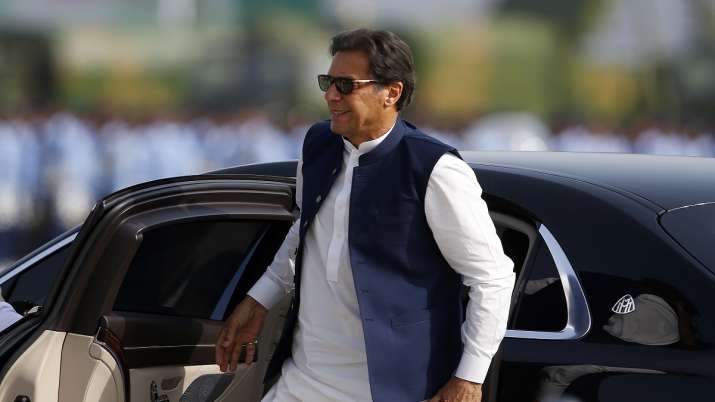
Pakistan’s Prime Minister Imran Khan arrives in Islamabad, Pakistan to participate in a military parade to mark Pakistan’s National Day
Highlight
- Pakistan’s assembly session adjourned till Sunday amid voting on no-confidence motion against PM
- Opposition MPs demand immediate vote on no-confidence motion against PM Imran Khan.
- Voting is expected on April 3, and on April 2 both sides will use the Assembly Forum to debate the matter.
Imran Khan’s no-confidence motion updatePakistan’s National Assembly session was abruptly adjourned on Thursday until Sunday after opposition lawmakers demanded an immediate vote on a no-confidence motion against Prime Minister Imran Khan, who had effectively lost a majority in the lower house.
As the session of the National Assembly began in Parliament House, Deputy Speaker Qasim Suri asked the MPs to discuss the items listed on the agenda.
However, opposition MPs demanded an immediate vote on the no-confidence motion against Prime Minister Khan.
After this, Deputy Speaker Suri adjourned the proceedings of the house till 11 am on Sunday. Strong opposition from opposition MPs.
The motion against the prime minister was introduced by the Leader of the Opposition in the National Assembly, Shahbaz Sharif, on 28 March and it was approved for debate on the same day.
The Assembly Secretariat had earlier released a 24-point agenda for Thursday’s session and the no-confidence motion was the fourth on the agenda.
Leader of the Opposition in the National Assembly Shahbaz Sharif moved the resolution under Article A-95 of the Constitution and was signed by 161 members. While moving the motion, Sharif had said that he was moving a no-confidence motion against Prime Minister Khan.
Voting is expected to take place on April 3 and before the crucial day, both the sides will use the assembly stage to debate the matter.
The position of the opposition parties has strengthened after two main allies of the government including Muttahida Quami Movement (MQM) and Balochistan Awami Party (BAP) joined the front against the government.
After the government lost its majority Colleagues betrayed it and pressure is mounting on cricketer-turned-politician,
However, his ministers have said that Khan will fight till “the last ball of the last over”.
Khan needed 172 votes in the lower house of 342 to thwart the opposition’s attempt. However, Jamiat Ulema-e-Islam Fazl (JUI-F) chief Maulana Fazlur Rehman said the opposition has the support of 175 MPs and the prime minister should resign.
No Pakistani prime minister has completed five years in his tenure. Also, no prime minister in Pakistan’s history has ever been deposed via a no-confidence motion, and Khan is the third prime minister to face the challenge.
On Tuesday, Prime Minister Khan strictly directed his party MPs not to attend the National Assembly session on the day of voting on the no-confidence motion against him, which is likely to be held in the first week of April.
Khan came to power in 2018 with a promise to create a ‘Naya Pakistan’, but miserably failed to address the fundamental problem of keeping commodity prices under control, setting sail for opposition ships to wage war on his government. was given.
Their chances of survival are dwindling and the easiest way to end the uncertainty is to win back the support of all allies and win back the dissidents within their own party.
Read also | Pakistan government crisis: Army pitches for backdoor deal between Imran Khan, opposition, say sources
Read also | Power crisis intensifies across Pakistan; Power plants closed on gas, coal, furnace oil: report